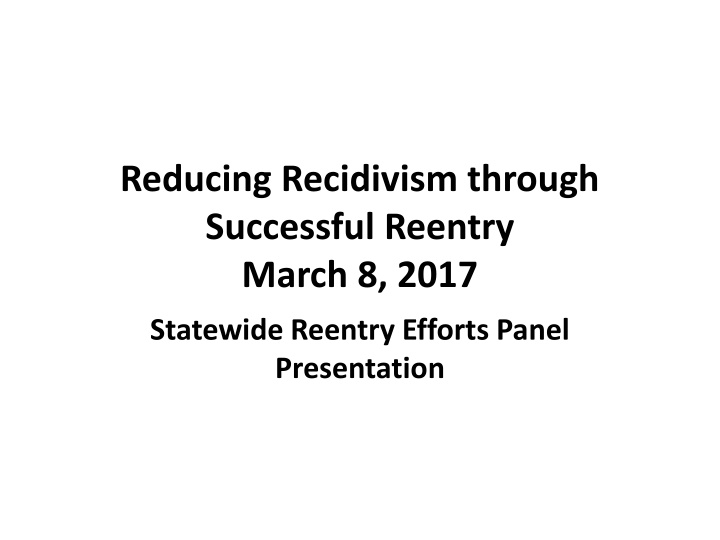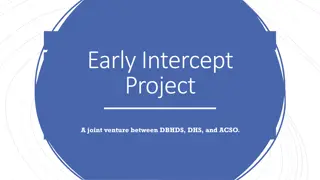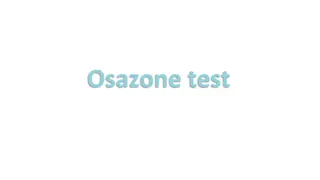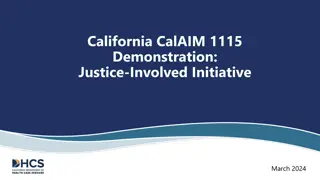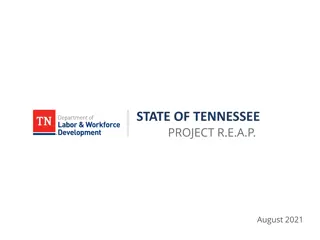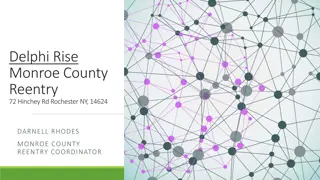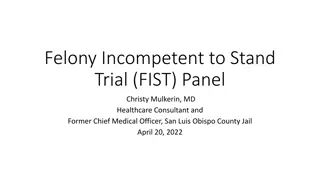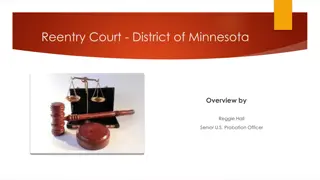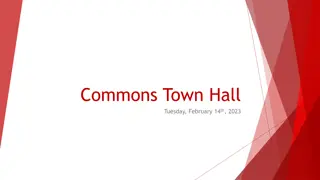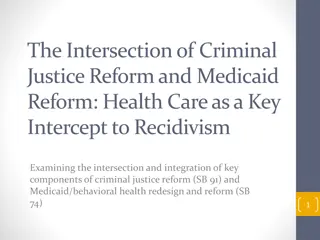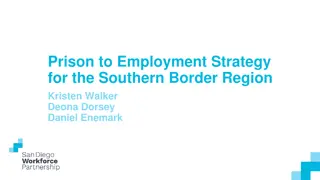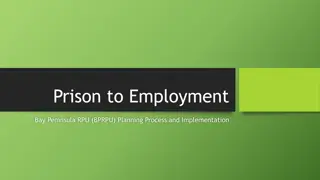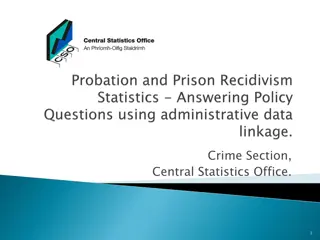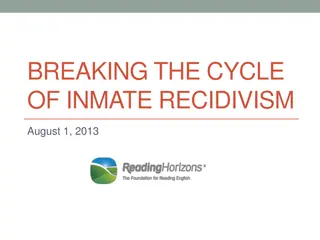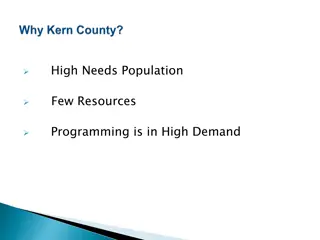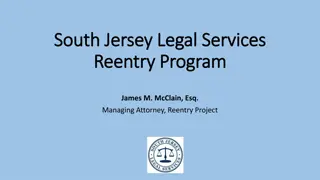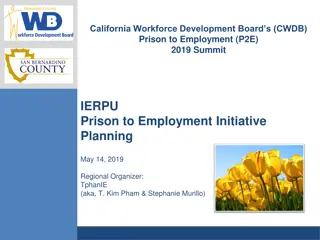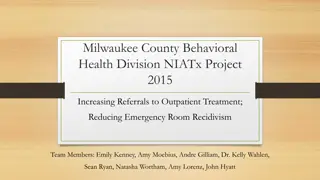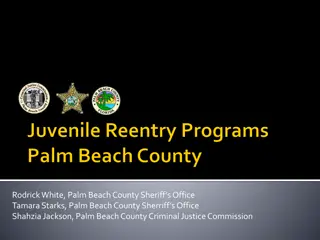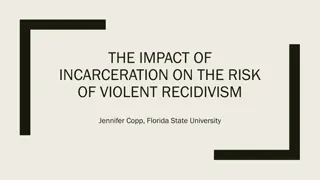Reducing Recidivism Through Successful Reentry Efforts
This presentation focuses on reducing recidivism through successful reentry efforts in the criminal justice system. Panelists discuss programs to enhance community safety and improve lives by improving communication, early identification of behavioral health issues, and linking individuals to services. Therapeutic courts and various justice processes are explored to address recidivism and promote rehabilitation.
Download Presentation

Please find below an Image/Link to download the presentation.
The content on the website is provided AS IS for your information and personal use only. It may not be sold, licensed, or shared on other websites without obtaining consent from the author.If you encounter any issues during the download, it is possible that the publisher has removed the file from their server.
You are allowed to download the files provided on this website for personal or commercial use, subject to the condition that they are used lawfully. All files are the property of their respective owners.
The content on the website is provided AS IS for your information and personal use only. It may not be sold, licensed, or shared on other websites without obtaining consent from the author.
E N D
Presentation Transcript
Reducing Recidivism through Successful Reentry March 8, 2017 Statewide Reentry Efforts Panel Presentation
Panel Presenters Morgen Jaco, Alaska Department of Corrections, moderator Marian Lilley, Alaska Department of Corrections Geri Fox, Alaska Department of Corrections Kate Sumey, Alaska Court System Therapeutic Courts Donald Revels, Department of Labor
Sequential Intercept Mapping Illustrates how individuals with behavioral health needs come into contact with and flow through the criminal justice system We want to divert individuals at various intercept points on the Sequential Intercept into behavioral health services
Programs discussed today Improve cross-system communication and collaboration Improve early identification of individuals with behavioral health issues as they come into the criminal justice system Increase linkage to services Reduce recidivism, enhance community safety and improve quality of lives
ALASKA COURT SYSTEM Therapeutic Courts Overview, Kate Sumey March 2017
Traditional & Therapeutic Justice Process THERAPUETIC PROCESS Problem Solving/Dispute Avoidance Therapeutic Outcome Collaborative Process Interest or Needs-Based Alternative Dispute Resolution Forward Looking Judge as Coach Effective Wide Range of Participants & Stakeholders TRADITIONAL Dispute Resolution Legal Outcome Adversarial Process Rights-Based Emphasis on Adjudication Backward Looking Judge as Arbiter Efficient Few Participants
Comparison of restorative, community, therapeutic, and reparative justice Retributive Justice Punishment of offender Therapeutic Justice Treatment of offender Community Justice Focus on strengthening community Similar to restorative; address social problems Restorative Justice Focus on offender, victim, and community Repair harm to victim, community and restore offender Victim repaid; community engaged; offender reintegrated in community; reduced recidivism Circle sentencing, family group conferencing, victim offender mediation, reparative boards Focus Goals in sanctioning Eye for an eye; isolate Correct behaviors; rehabilitation Measures Equality Offender is healed ; increased accountability; reduced recidivism Drug courts, mental health courts, tribal courts Community involved in crime response strategies; decreased crime rates Examples Current system Community policing, tribal courts
THERAPEUTIC COURTS MISSION STATEMENT The mission of the therapeutic courts is to divert people with substance abuse and/or mental health diagnosis with open court cases (both criminal and civil) into community treatment and services to prevent further contact with the legal system. 9
Therapeutic Courts Multidisciplinary Therapeutic Court Team works together to: Ensure public safety Protect due process rights Systematically address defendant s substance abuse/mental health, family and/or criminality issues 10
Therapeutic Courts Program Overview A team approach to monitor and encourage a participant s progress Utilizes sanctions and incentives to help modify behavior change (see behavioral response list) Upon successful completion of the program, participants sentences are imposed according to the initially negotiated agreements 11
Therapeutic Courts are not the easy way out They are an alternative for those who want to stop the downward spiral of a life of substance abuse and legal involvement. 12
Traditional CourtsTherapeutic Courts Judge Prosecution Defense Participant Defendant Jury 13
In addition to mental health and/or substance treatment assessment, all potential participants receive a risk/needs assessment that evaluates the following: 14
Alaska Therapeutic Courts Fairbanks Bethel Palmer Anchorage Kenai Juneau Ketchikan 15
Anchorage Therapeutic Courts CINA Coordinated Resources Project Veterans Court Therapeutic Court Family Reunification Cases Adult Mental Health Criminal Cases Veterans with Felony and Misdemeanor Cases PC: Desire Sang dsang@akcourts.us 907-264-0466 PC: Kate Sumey ksumey@akcourts.us 907-264-0886 PC: Desire Sang dsang@akcourts.us 907-264-0466 16
Anchorage Therapeutic Courts Wellness Courts Municipal Wellness Court Felony Drug Wellness Court Felony DUI Wellness Court Misdemeanor Drug/DUI Cases State Felony Drug Cases State Felony DUI Cases PC: Jennifer Fredericks jfredericks@akcourts.us 907-264-0892 17
Alaska Therapeutic Courts Fairbanks Wellness Court Fairbanks Juvenile Treatment Court Juneau Therapeutic Court Bethel Therapeutic Court Felony/Misdemeanor Drug/DUI Cases Felony/Misdemeanor Drug/DUI Cases Juvenile Mental Health Cases Felony/Misdemeanor Drug/DUI Cases PC: Lynn Kassman lkassman@akcourts.us 907-543-1121 PC: Amy Bollaert abollaert@akcourts.us 907-452-9307 PC: Amy Bollaert abollaert@akcourts.us 907-452-9307 PC: Samantha Abernathy sabernathy@akcourts.us 907-463-4758 Juneau Coordinated Resources Project Ketchikan Therapeutic Court Palmer Coordinated Resources Project Adult Mental Health Cases Felony/Misdemeanor Drug/DUI Cases Adult Mental Health Cases PC: Samantha Abernathy sabernathy@akcourts.us 907-463-4758 PC: Chris Pulju chris.pulju@alaska.gov 907-225-8874 PC: Kristin Hull khull@akcourts.us 907-746-8142 18
Alaskas Newest Therapeutic Courts Palmer Safe Babies Court/Palmer Infant and Toddler Court (PITC) Palmer Wellness Court Kenai/Henu Community Wellness Court Drug/Alcohol court; collaboration between the Kenaitze Indian Tribe and the Alaska Court System Therapeutic CINA court Felony/Drug/DUI Cases PC: Jessica Clarkson jclarkson@akcourts.us 907-746-8183 PC: Kristin Hull khull@akcourts.us 907-746-8142 PC: Terri Telkamp ttelkamp@akcourts.us 907-283-8552 www.kenaitze.org 19
Benefits to Participants Alcohol/drug-free lifestyle Improved physical health Self-sufficiency Improved parenting and family relations Reduction/dismissal of jail time to be served Reduction/dismissal of fines ordered Possibility of Limited Driver s License in some cases 21
Benefits to Legal & Social Services Systems Defense attorneys see their client getting help Prosecutor has control over who gets admitted Coordinated team effort streamlines judicial process Probation, Family Services & Treatment have Court s attention Strong intervention for substance abusing client Offender is much more accountable to the system 22
Benefits of Therapeutic Courts Working alone, neither the community or the courts can respond adequately to the overwhelming problems caused by substance abuse/mental health issues Working together building strong partnerships between the courts and community agencies allows all systems to be more effective 23
Resources Alaska Justice Forum Summer/Fall 2016: Therapeutic Courts in the Alaska Court System https://www.uaa.alaska.edu/academics/college- of-health/departments/justice-center/alaska- justice-forum/33/2-3summerfall2016/c- therapeutic-courts.cshtml
Resources Alaska Court System Therapeutic Courts website: http://courts.alaska.gov/therapeutic/tcinfo.ht m#about
Alaska Department of Corrections Special Release Programs Marian Lilley
Mental Health Release Planning *Identified and referred while incarcerated *Planning up to 3 months before release and 2 months after Seriously Mentally Ill or mentally ill with a co occurring condition such as cognitive disorder, TBI, Dementia, SUD Voluntary, (Unless mandated by Felony Probation/Parole;) motivated, willing to follow through with release plan Level of functioning and vulnerability considered; lacks resources, support, income
Release Planning Assistance: Working with clinicians in the jails Communication w/ inmates to gather information Connection to community MH agency (statewide) Some SUD assessment; linking to treatment Benefits information and support/Medicaid
Release Planning Assistance: First month medication coverage prior to appt Other social services referrals and linkages Communication with family, guardian, courts, etc Housing options; 1-3 months rent support All planning is case by case/individualized
Alaska Department of Corrections Pretrial Services Division Geri Miller-Fox
History of Recommendations for Pretrial Services FINDINGS SB91 Presented the opportunity for the State of Alaska to implement a long-standing public safety priority Pretrial Services has been requested for more than 40 years. Traditional pretrial concerns have included issues such as: Lack of available information for judiciary Lack of information about offender risk Lack of oversight for those who post bail and need supervision Lack of options for release supervision and diversion 32
Pretrial Development Team COURTS & JUDICIARY PROSECUTORS TREATMENT SERVICES COMMUNITIES LAW DEFENDANT REPRESENTATIVES VICTIM RIGHTS RESEARCHERS ENFORCEMENT 33
Pretrial Risk Assessment Measures two risk components: 1. The likelihood that someone will Fail To Appear (FTA) for scheduled court hearings; 2. The likelihood that someone will have a New Criminal Arrest (NCA) while during pretrial release status. 34
Pretrial Functions Assessment Low, Moderate, High, with a report to the court within 24 hours Monitoring Low/Moderate risk defendants will be monitored. Diversion *Mental Health *Tribal Courts *Substance Abuse MOD HIGH Booking or Summons Assessment & Initial Appearance LOW Diversion Supervision Moderate & High risk defendants, if released, will be supervised on standard or enhanced pretrial supervision. Initial Appearance The Court has the option for pretrial supervision at this juncture. 35
Pretrial District Offices 1st: 3rd: 4th & 2nd: Fairbanks Juneau Anchorage 36
Cost of Services COST OF INCARCERATION The current cost of incarceration is $149.62 a day. COST OF PRETRIAL SUPERVISION Projected average daily cost is approximately $4.60. 37
Alaska Department of Corrections Pretrial Services Division Geri Miller-Fox Director, Alaska Pretrial Services Division Department of Corrections geri.fox@Alaska.gov (907) 269-7405 38
Alaska Department of Labor Statewide Reentry Employment Services Donald Revels
DOLWD Commissioner: Heidi Drygas Director: Ed Flanagan Statewide Reentry Employment Coordinator: Donald M. Revels Supervisor Assistant Director: James Harvey
Mission Statement Provide labor exchange, employment and training services, and unemployment insurance to Alaskans and Alaska businesses, thereby advancing opportunities for employment and providing economic stability for communities in Alaska.
Services Operate the Alaska Labor Exchange system (ALEXsys), an online no-fee labor exchange system that connects job seekers with employers. Operate job centers across the state to provide services to job seekers and employers and promote long-term employment for Alaska s workforce. Provide job training and counseling services to qualified job seekers and veterans.
Services continued Provide temporary unemployment insurance benefits to eligible unemployed workers while they are seeking employment. Assist unemployment insurance claimants and adjudicate claims. Collect employment security tax contributions and maintain the integrity of the Unemployment Insurance Trust Fund from which benefits are paid. Provide adult basic education services to adults who need a high school diploma or General Educational Development (GED) certificate.
Employment & Training Alaska Career Ready, WorkKeys, Career Ready 101 Apprenticeships DEI and T2W EO/ADA Equal Opportunity/Americans with Disabilities Act Fidelity Bonding Foreign Labor Certification MASST Mature Alaskans Seeking Skills Training Rapid Response (public) Rapid Response (internal) Seafood STEP State Training and Employment Program Trade Act (TAA) Veteran Services WIOA Workforce Investment Act WOTC Work Opportunity Tax Credit Workers Compensation Search
Present & Future efforts in recidivism reduction Statewide Reentry Employment Coordinator Collaboration with DOC, DHSS and Reentry Coalitions LEAP 2/Bridge to Success (Linking to Employment Activities Pre-Release) Supporting agencies whom efforts are in reducing recidivism Employment After Incarceration workshops Building a highway from DOLWD to employers, reentrants and DOC.
Regional managers Brad Gillespie South Central Region (907) 269-4825 Job Seekers: midtown.jobcenter@alaska.gov Employers: anchorage.employers@alaska.gov Rachel O Brien Gulf Coast Region (907) 335-3000 Job Seekers & Employers: peninsula.jobcenter@alaska.gov Willie Young Interior Region (907) 451-5967 Job Seekers: fairbanks.jobcenter@alaska.gov Employers: fairbanks.employers@alaska.gov Michael Hutcherson Southeast Region (907) 465-4562 Job Seekers: juneau.jobcenter@alaska.gov Employers: juneau.employers@alaska.gov Toll-free in Alaska (877)724-2539
Contact Info Morgen Jaco, Alaska Department of Corrections, morgen.jaco@alaska.gov Marian Lilley, Alaska Department of Corrections marian.lilley@alaska.gov Geri Fox, Alaska Department of Corrections geri.fox@alaska.gov Kate Sumey, Alaska Court System Therapeutic Courts ksumey@akcourts.us Donald Revels, Department of Labor donald.revels@alaska.gov
